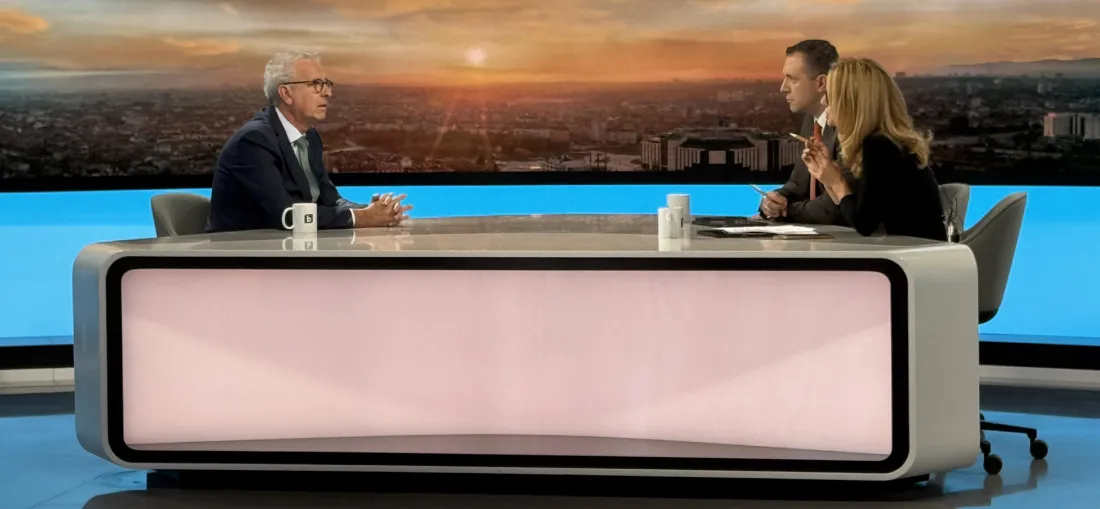Pierre Gramegna in interview with bTV (Bulgaria)

Interview with Pierre Gramegna, ESM Managing Director
bTV (Bulgaria)
4 November 2025
Interviewers: Maria Tsantsarova and Zlatimir Yochev
bTV: Yesterday Bulgaria published its first budget in euros, how important is that budget?
Pierre Gramegna: It is always very important to prepare a budget and to send it in, especially on the eve of becoming a member of the euro area. Bulgaria has a very good track record. And if I look at the numbers of the Bulgarian budget, they are quite good: a deficit that is lower than 3%, inflation that is going down, and debt-to-GDP that’s lower than 30%. Very few countries have such good numbers. So it is good and it is normal that you have qualified for becoming a member of the euro area.
What mistakes should the government avoid when preparing the budget for next year?
All countries are faced with the necessity to increase defence expenditures. It shows also that European countries need to do more in this area. And with the geopolitical turmoil that we have everywhere, including on the doorstep of Europe, it is unescapable. The European Union has foreseen a support system called SAFE that countries can apply for. It will be in the next years, a constant effort from all countries.
The skeptical parties in Bulgaria like to scare Bulgarians with the ESM. Is it true that if for example French public finances go bad, Bulgaria will need to fill in the gap in their budget?
First, the very simple answer is ‘no’. That's a very simple answer, but if you give me a little bit of time to explain how the European Stability Mechanism works. Bulgaria will have 1.2% of the whole capital of the ESM. The paid-in capital is €81 billion. So this €81 billion, including the 1.2% of Bulgaria, is not going to be used to support countries. It is just a guarantee. With this €81 billion, the European Stability Mechanism can lend up to €500 billion. That's what we have done – we have assisted five countries in the last decade. So these loans are provided by the ESM at very cheap rates because we have a AAA rating. And then, these rates are passed over, transmitted to the beneficiary country that needs it. So, the paid-in capital stays.
Now you might say, what happens if a country has problems? Well, we look back at the five countries that we have assisted in the last decade. They are paying back their loans because it is not a subsidy. It is a loan, and these loans come with conditionality. So, countries need to carry out reforms to make sure that they can reimburse their loans.
How is Bulgaria going to be involved in the decisions to provide financial assistance?
To take the decision at the ESM to support a country, we need consensus. Every country must agree. This is also an excellent question, because Bulgaria will have one vote like the other 20 countries. We have now 20 countries in the euro area, soon 21 with Bulgaria, the same in the ESM. We work by consensus. The ESM is an intergovernmental institution. It doesn’t function like the European Union because not all the countries are part of the ESM.
Which are the conditions in which financial assistance can be granted by the ESM?
The way it normally works: it is the initiative of a country to ask for support of the ESM. It is not the institution that offers it, and that's important to understand. Let me also answer, and now with some delay the question you asked on France. France has no problem to refinance its debt on the market, so investors do not see a risk with France. That being said, again, the ESM is there for all the countries.
Can the EU go bankrupt?
The answer is no. There is one very important thing to understand. We are the only part of the world - the EU, and in particular, the euro area - that has a set of rules to make sure that we have fiscal discipline, that our budgets are under control. No other area in the world has that. So we have a framework that makes sure that countries are virtuous, that they are disciplined. If you look at debt-to-GDP, debt as a ratio of Europe's wealth, the average is 88% today. If you look at the United States, it's 120%. If you look at China, it's higher. Don't even mention Japan. We have a framework, and now sometimes this is seen as a handicap, but this is a great advantage because it forces you to have good discipline, and good discipline is good for your economy and it's good for financial stability. That is why joining the euro area for Bulgaria is such an achievement. Now, you have been in this special situation that you pegged your currency, the lev, first to the German mark, then to the euro.
How do you evaluate whether Bulgaria can enter the euro, given that there are less than two months to go?
You have already done a lot of efforts. You have now qualified. It took a lot of time, especially because inflation was high. But now you're going to join this very precious club. And, in fact, joining the euro is a journey. But once you are in, the framework is also there to protect you. So, I think it will be very beneficial for your economy, because being a part of the euro area reduces [bond] spreads, makes the country more attractive for foreign investment, and will boost growth. So it's a win-win situation.
Which reforms do we need to implement to guarantee successful economic growth in the euro zone framework?
First, I have to say that the ESM is not there to give advice to countries if they have not applied for support. This is done by the European Commission. Now, this being said, I would like to answer your question, to a certain extent. The best way to support your economy, the best way to have stable finances is to have growth. And that means to be competitive. Because if you have growth, that will generate additional resources, and that will help you stabilise the budget. And we've had in Europe, unfortunately, the last 10 years, what we call shallow growth, 1% growth, 1.5% sometimes, but the average is too low. We've had less growth than the United States, half the growth of the US in the last 10 years. It is important that we have growth. That's the first thing. Second, I think your country has already had budgetary discipline in the journey to the euro, so I'm not worried about Bulgaria.
What is happening with the purchasing power and the economics of countries after they join the euro zone? When can we expect first results?
I think that because access to the euro area is a process, on the first of January, it won’t be a miracle happening. The miracle, in a way, is that you will have the banknotes, the euros, like in the other countries, but you are well prepared for it. I think it's going to be a smooth transition. Now, in some places, there has been the observation that there was a little bit of a price increase, but that is very temporary. I know that the Bulgarian government has looked after that by having double pricing. That helps a lot. That's going to be controlled. If I look at the last country that joined the euro area, Croatia, the increases were very short-lived. But it is good that controls are done because it is a moment of change. It's always an opportunity. Businessmen, they also have to earn money, so you have to make sure they apply the rules.
Which are the rights steps that Bulgaria can undertake to regulate prices and when is the right moment to do so?
I think the government has already announced the measure. It was inspired by those that were taken by other countries. In fact, the first countries that introduced the euro also did that. Obviously, as I said, there can be short-lived increases, but that's why controls are necessary. It is the task of the government to make sure that the transition is smooth.
Author

Contacts


